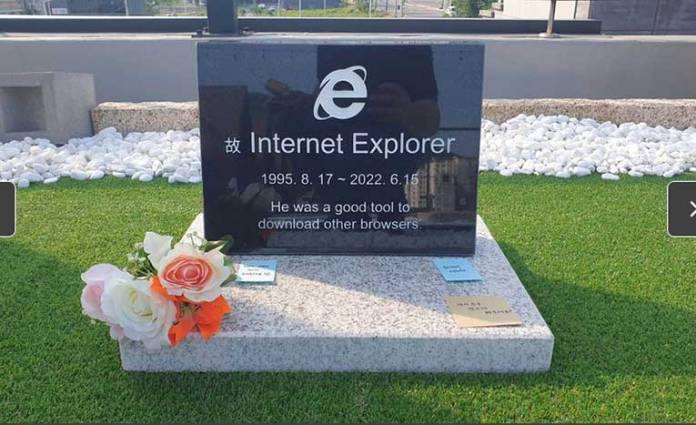
After Microsoft announced it is scaling support for Internet Explorer (IE) on Wednesday – after 27 years of dominating the web – the world is celebrating the death of the once-major browser with a viral photo. It started when a South Korean software engineer, Jung Ki-young, spent one month and 430,000 ($330) to design a gravestone that would commemorate the demise of the browser, Reuters reports.
Jung displayed the gravestone at his brother’s café in Gyeongju and the photo of the headstone went viral in a few hours, forming memes and crude jokes around the world. And the gravestone came with an epitaph written in English: “He was a good tool to download other browsers.” The gravestone bore Internet Explorer’s logo and even provided a date of birth as August 17, 1995, and date of death as June 15, 2022.
Jung said he only intended to create something fun with the gravestone, but was surprised that it went viral and gained global attention within two days. He said he is grateful to be able to arrest worldwide attention with an innocent joke that centered on IE, nothing that he will not miss the browser.
“That’s another reason for me to thank the Explorer, it has now allowed me to make a world-class joke,” he said. “I regret that it’s gone, but won’t miss it. So its retirement, to me, is a good death.”
Lance Ulanoff of TechRadar also expressed relief that IE is gone, saying it gained global prominence by foisting itself on people. He said Explorer became the most widely-used browser in the world in from 1995 to the early 2000s because it was bundled with Microsoft Office, so it became the default browser in billions of computers from various manufacturers around the world.
“We should not mourn Internet Explorer so much as we should wonder how it maintained its dominance for so long, and how so many businesses and market sectors were duped into using it,” Ulanoff stated. “It survived not because we loved it, but because some services were designed so that they couldn’t work without it.”
Internet Explorer was launched in 1995 and managed to push Netscape Navigator, which had been the first and only browser at that time, to the background. It came bundled in all computer models and relegated Netscape, which dominated the market by 90% in 1996 to 23% in 2001. But when Google Chrome came up in 2008, it surpassed Explorer in user ranking and the emergence of Mozilla Firefox pushed Explorer farther back.
Today, Microsoft is paying more attention to its Chromium-based Edge browser, which is reputably better and faster than Internet Explorer.










